Oct 19, 2017 - Dr. Bruce Gordon, Titus Street Professor of Ecclesiastical History at Yale Divinity School, was the speaker at the 21st Annual Carls-Schwerdfeger History Lectureship on October 19, 2017. He lectured twice on themes related to the Protestant Reformation, whose 500th anniversary has been widely celebrated in 2017.
In the afternoon, Gordon talked to 135 people in the Carl Grant Events Center about “John Calvin’s Institutes of the Christian Religion.” Pointing out that Calvin revised the book several times, Gordon indicated that it was the product of a restless soul who constantly sought to communicate the message of the Bible through words. Gordon stated that Calvin was one of the great autodidacts of his time theologically, since his formal training was not in theology, but in the liberal arts and law. In place of the word theology, Calvin preferred the term doctrine, which he defined as that which scripture alone revealed. The Institutes consists largely of two parts: knowledge of God and knowledge of ourselves. For Calvin, true knowledge is revealed in God’s Word. It shows us who God is – the Creator, Redeemer, and Holy Spirit – and who we are – sinners incapable of saving ourselves. Calvin emphasizes the importance of piety, a central part of which is men and women taking refuge in Christ for the forgiveness of their sins and being “engrafted” into His body. To understand better Calvin’s notion of piety, Gordon talked about the church, for which Calvin had a very high regard. According to Calvin, salvation cannot occur apart from the Church, and it is the institution where all spiritual growth and faith happen. In Calvin’s eyes, a life of piety is “sweet,” a word that in its cognate forms appears many times in his writings. Gordon mentioned that Calvin’s Institutes remains the best-known Protestant book of the Reformation, and he pointed out that religious leaders over time have viewed and used Calvin and his Institutes in a variety of ways. Responding to religious disputes in the late sixteenth and seventeenth centuries, for example, Protestants produced new editions of Calvin’s Institutes with notes that allowed for a better understanding of its contents among pastors and theologians. While Calvin’s name remained influential during the eighteenth century, very few people read his work, and his teachings, particularly predestination, were often the objects of attack. Interest in Calvin revived in the nineteenth century amid the threat of modernity, with liberals presenting him as the father of modern democracy and an agent of progress, and conservatives using him to repudiate liberal ideas. In our own day, Calvin has gained some prominence among Protestants around the world, including China, where they view him as a voice of opposition to oppressive government. Gordon concluded by saying that Calvin continues to be an extremely controversial figure, with no resolution of the debate in sight.
The title of Gordon’s evening lecture, delivered to an audience of 625 people in Union’s G. M. Savage Memorial Chapel, was “What Happened to the Bible in the Reformation?” Stating that the Bible was at the heart of the Reformation, Gordon lectured primarily on two main points: what the Protestant reformers, starting with Martin Luther, thought the Bible and its authority were, and how the tremendous growth of knowledge in that era, including the rediscovery of old languages as new knowledge, affected the Protestants’ approach to the Bible. In the case of Luther, he argued in favor of scripture alone (sola scriptura), not the human institutions of the papacy and church councils, as the supreme authority in matters of doctrine and teaching in the Church. As for the rightness of his position, Luther claimed that he had received a prophetic calling from God, and that his religious experience of justification by faith had allowed the Holy Spirit to lead him to a true interpretation of scripture. Luther concluded that the Word of God was related to the books of the Bible that preached the Gospel, i.e., treated of Christ in their texts; the books that did so he considered apostolic, while he denied apostolic lineage to those that did not, such as Hebrews and James. Gordon said that though the Protestant interpretation of the Bible was radically new, it had roots in medieval culture. To meet the problem of a multiplicity of interpretations of scripture emerging from the Protestant doctrine of the priesthood of all believers despite the reformers’ message of the clarity of scripture, Protestant leaders promoted the ideal of an educated clergy to whom the responsibility of scriptural interpretation should be given. They used new linguistic and textual knowledge to help determine divine authorial intention, which was at the heart of their sola scriptura doctrine and their arguments against divergent readings of texts. A part of their work involved the introduction of vernacular translations of the Bible, which they concluded would always be approximations of the original texts, since new knowledge in the areas of languages and manuscripts was constantly coming to light, making ever better translations possible. One of the languages that Protestants began to study in earnest was Hebrew, which, among other things, resulted in the Protestants’ creation of study Bibles that used the Rabbinic tradition of wrapping the pages of Biblical texts in commentary. In his conclusion, Gordon stated: “The Reformation unleashed the force of historical, philological, and textual criticism, but at the same time, it more than any other age made scripture available to the people, and made a movement which coalesced around this idea of the absolute authority of the Bible.” In the end, the Bible “became a book that both defined and challenged a movement.” Following the lecture, Gordon autographed copies of his books Calvin (Yale University Press, 2009) and John Calvin’s Institutes of the Christian Religion: A Biography (Princeton University Press, 2016) in the chapel foyer.
Besides the two lectures, there was a dinner held in honor of Gordon in Union’s Chapman Dining Room. During a brief program, Gordon presented a copy of his book on the Institutes to Union President Samuel W. “Dub” Oliver and responded to several questions from attendees. In addition, Dr. Stephen Carls provided Gordon with a copy of James Alex Baggett’s So Great a Cloud of Witnesses: Union University, 1823-2000, and Dr. Ray Van Neste, Union’s Director of the R. C. Ryan Center for Biblical Studies, gave him copies of Reformation-related books that he had edited and a “REF500” coffee mug.
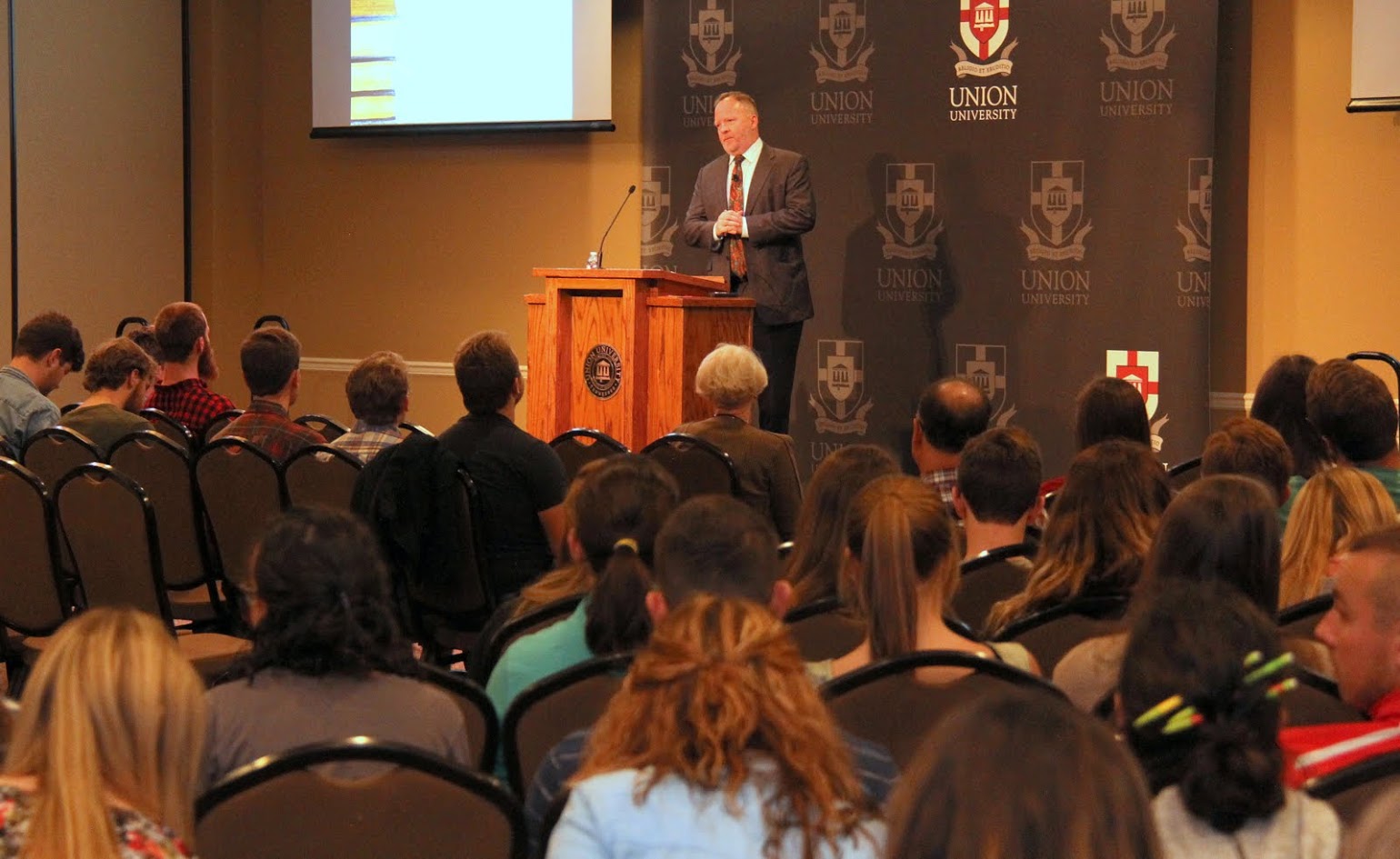
Dr. Bruce Gordon of Yale Divinity School speaks about "John Calvin's INSTITUTES OF THE CHRISTIAN RELIGION" as the Carls-Schwerdfeger History Lecturer on October 19, 2017.
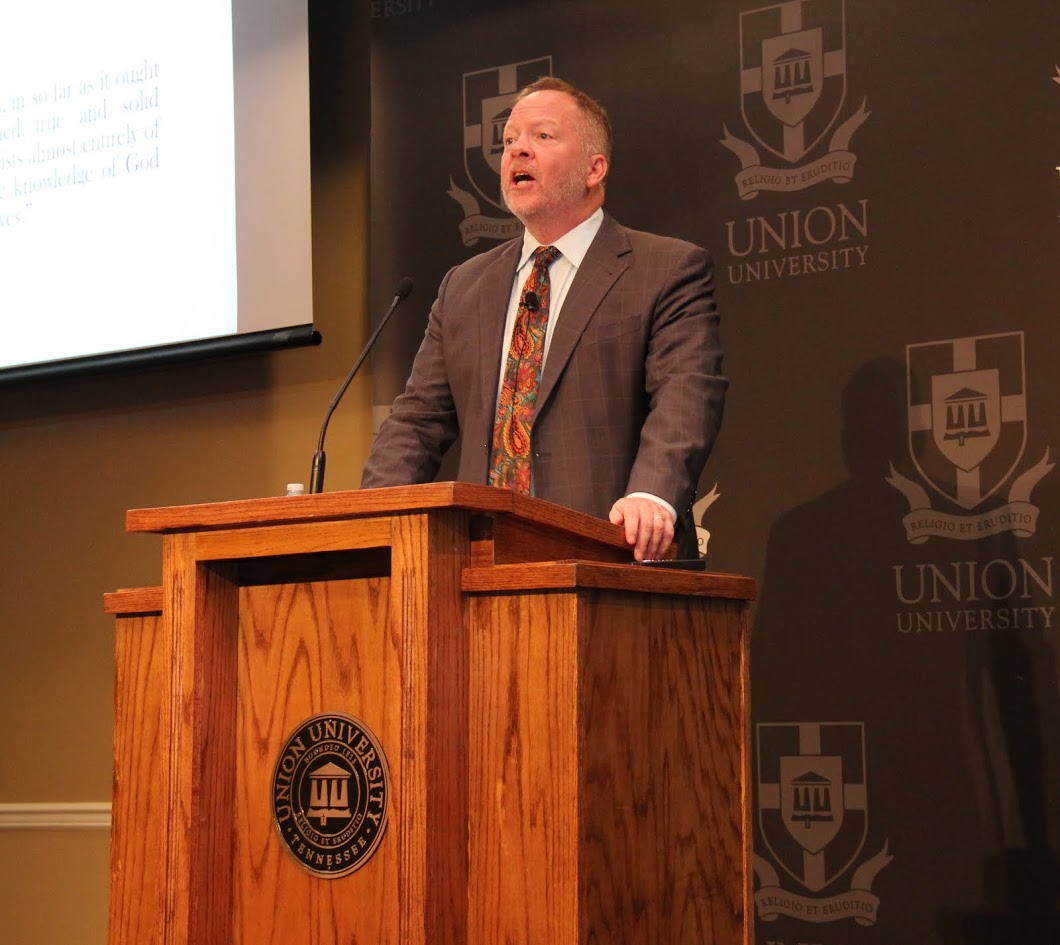
Dr. Bruce Gordon, Titus Street Professor of Ecclesiastical History at Yale Divinity School, lectures on "John Calvin's INSTITUTES OF THE CHRISTIAN RELIGION" in the Carl Grant Events Center on the afternoon of October 19, 2017.
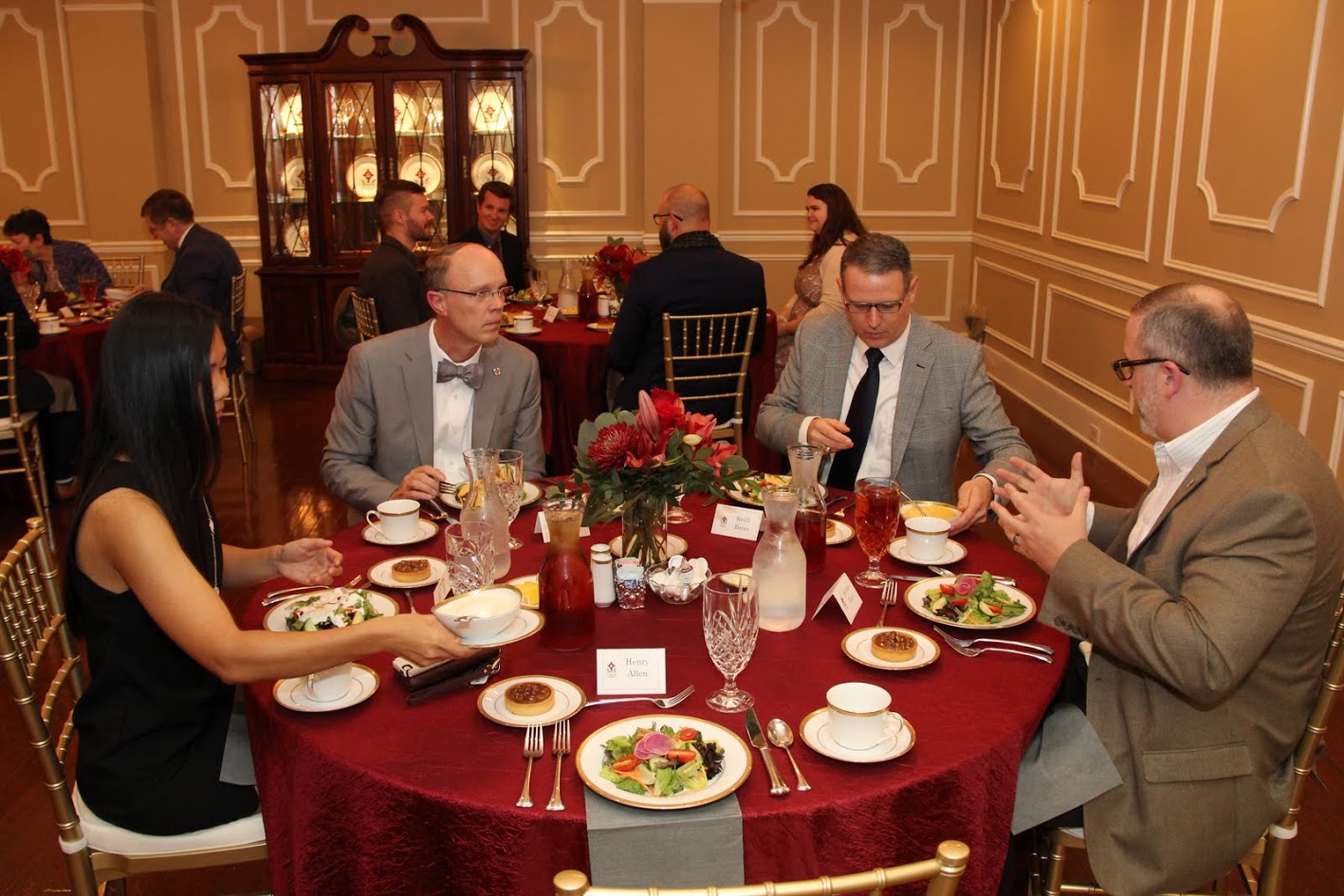
Attendees at the Carls-Schwerdfeger History Lectureship dinner in honor of Dr. Bruce Gordon prepare their salad plates while conversing. They are (left to right) Katherine Cheshire, Robert Briley, Dr. Keith Bates, and Dr. Nathan Finn.
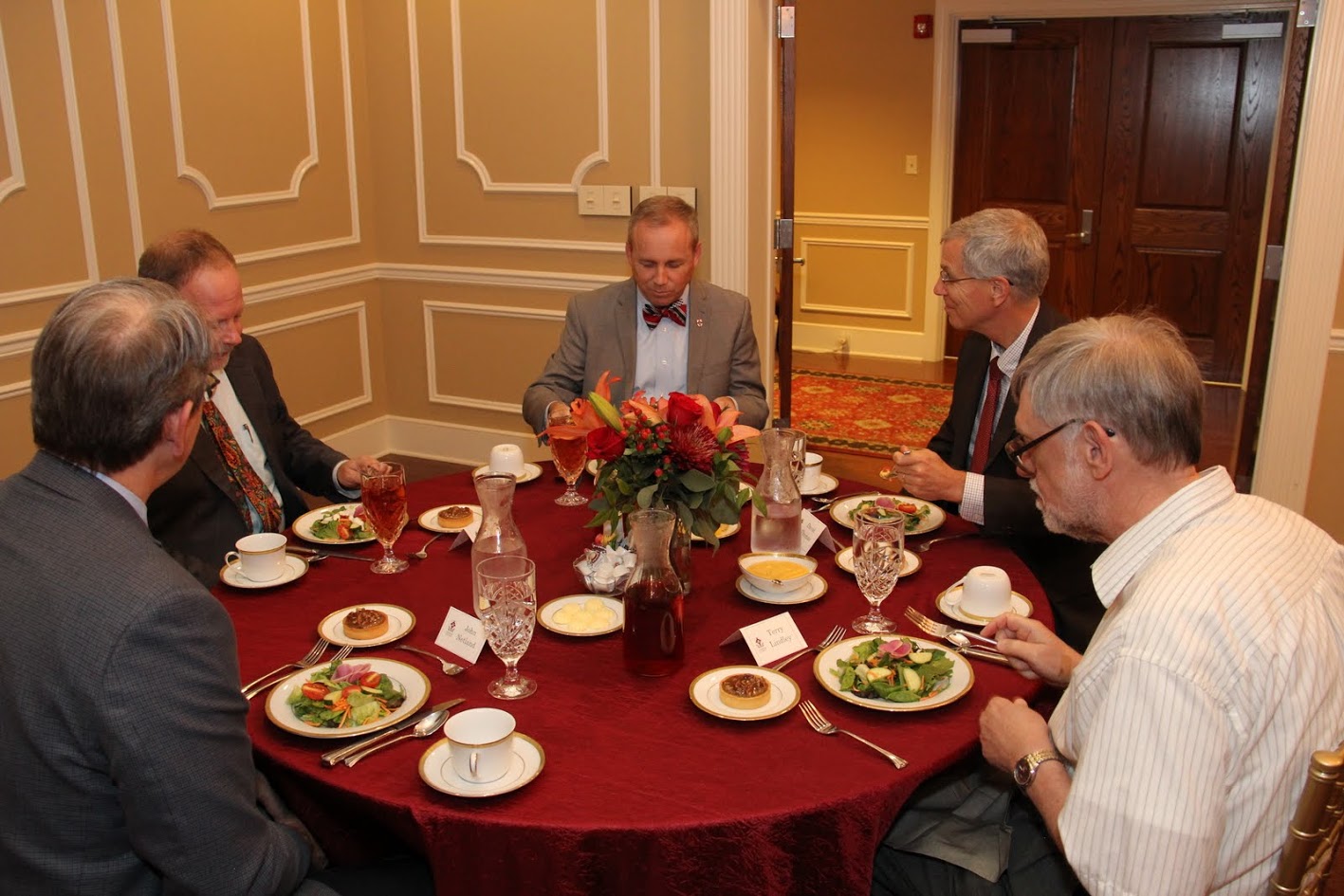
Attendees at the dinner in honor of Carls-Schwerdfeger History Lecturer Dr. Bruce Gordon enjoy good food and conversation on October 19, 2017. They are (starting on the left, going clockwise) Drs. John Netland, Bruce Gordon, Samuel W. "Dub" Oliver, David Thomas, and Terry Lindley.
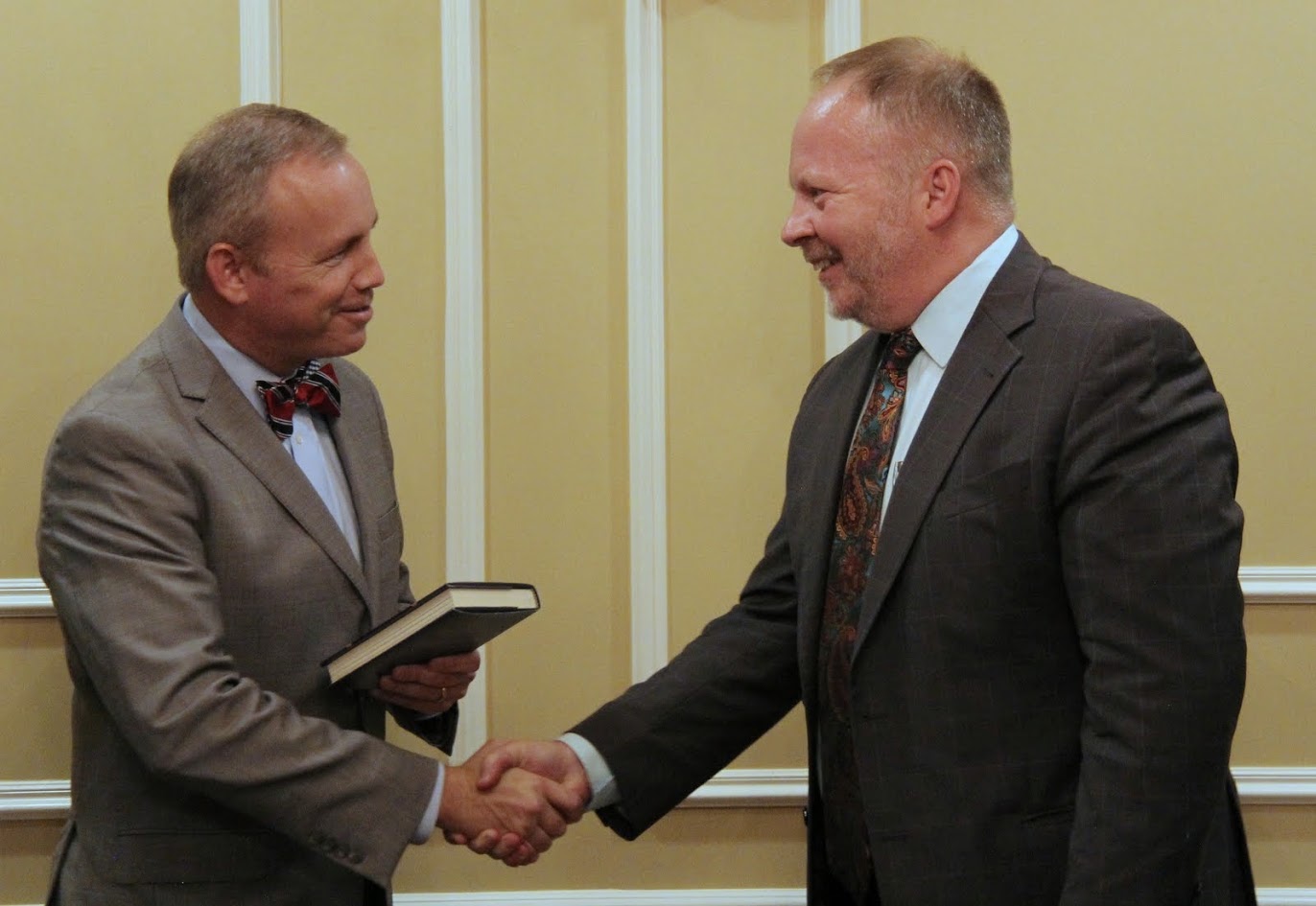
Dr. Bruce Gordon (right) presents a copy of his book JOHN CALVIN'S INSTITUTES OF THE CHRISTIAN RELIGION: A BIOGRAPHY to Union University President Samuel W. "Dub" Oliver at at dinner in Gordon's honor on October 19, 2017.
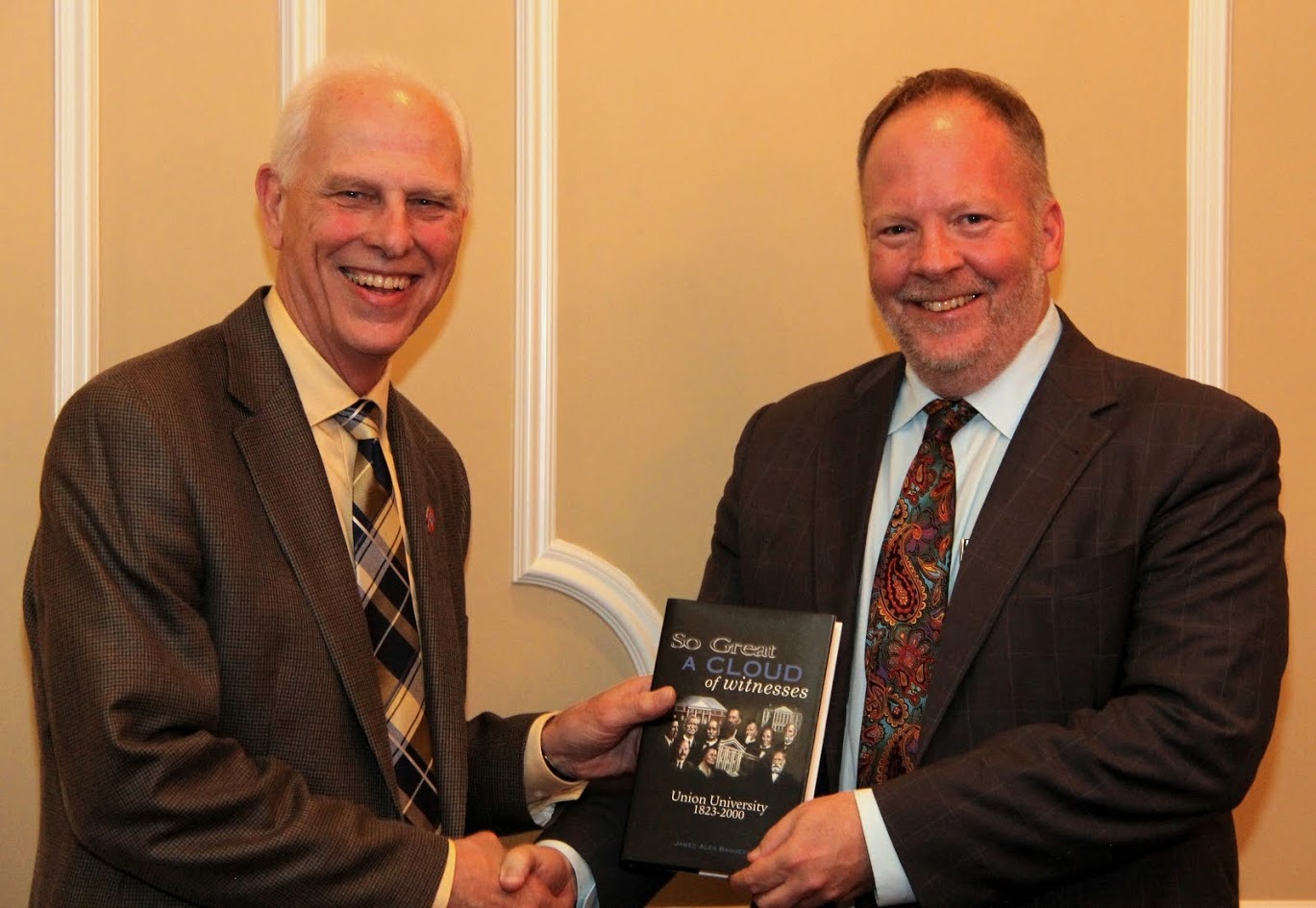
Dr. Stephen Carls (left) presents a copy of SO GREAT A CLOUD OF WITNESSES: UNION UNIVERSITY, 1823-2000 to Dr. Bruce Gordon at a dinner in Gordon's honor on October 19, 2017.
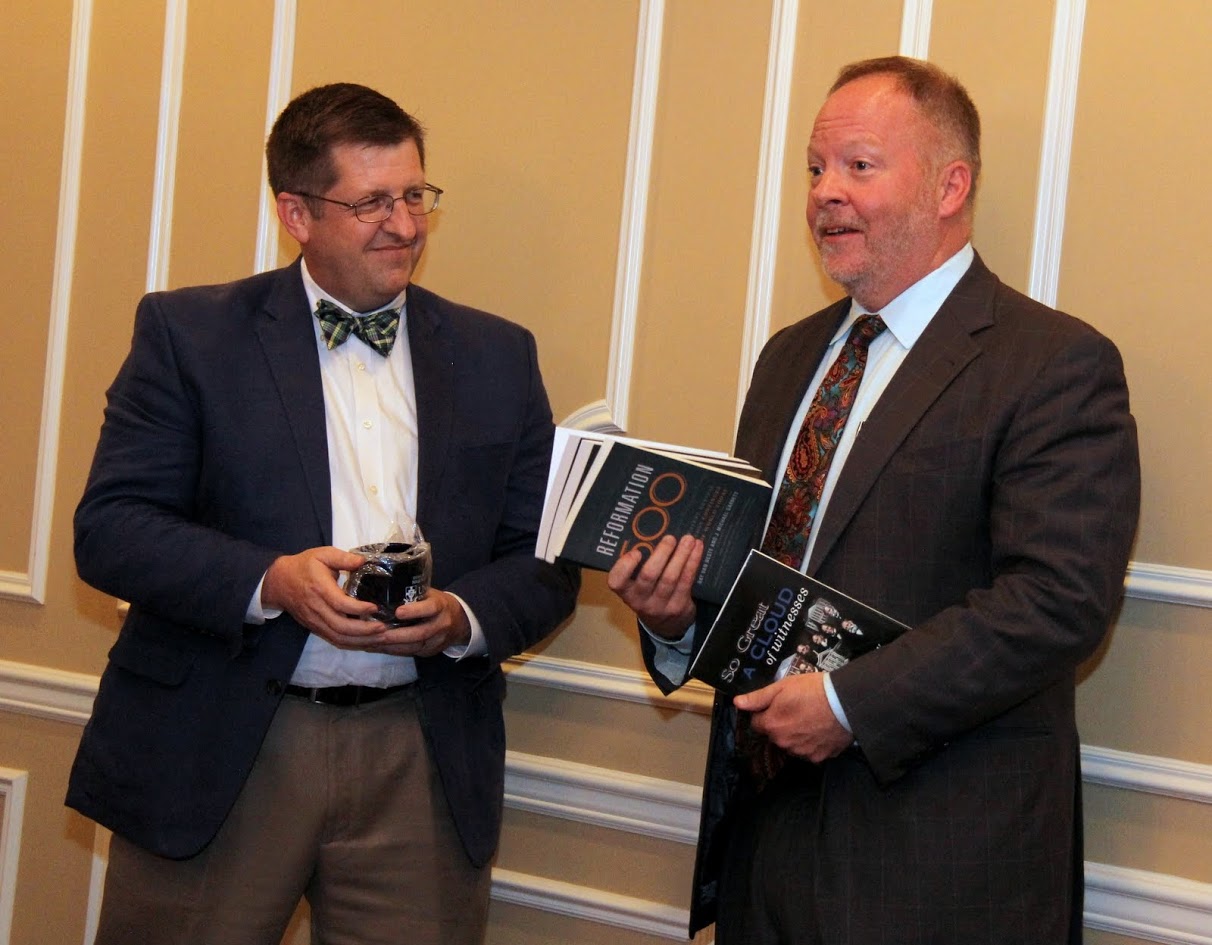
Dr. Ray Van Neste (left) of Union's School of Theology and Missions makes a presentation of books and a coffee mug to Dr. Bruce Gordon at the Carls-Schwerdfeger History Lectureship dinner in Gordon's honor on October 19, 2017.
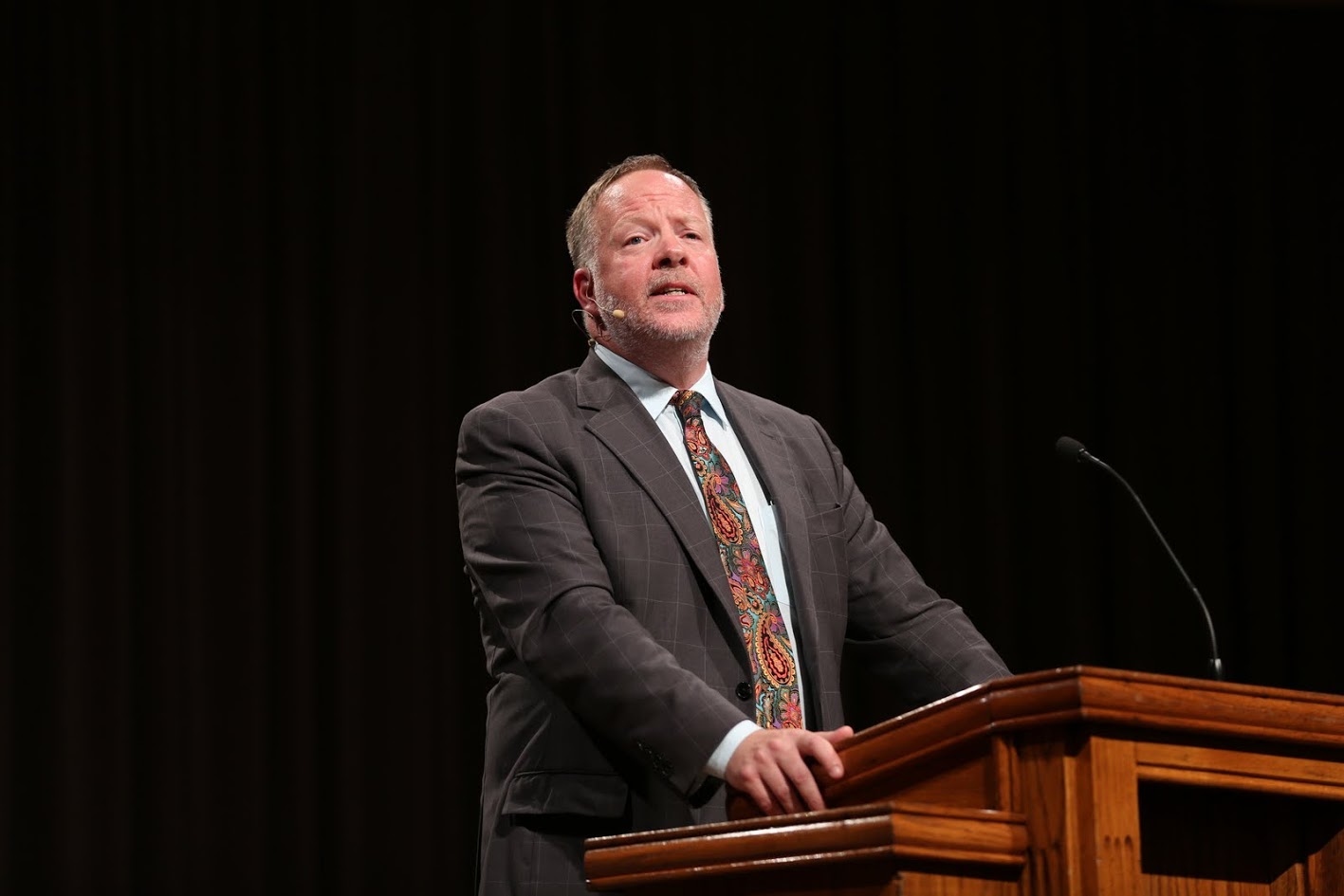
Dr. Bruce Gordon of Yale Divinity School lectures on "What Happened to the Bible in the Reformation?" in the G. M. Savage Memorial Chapel on October 19, 2017. Photo by Kristi Woody
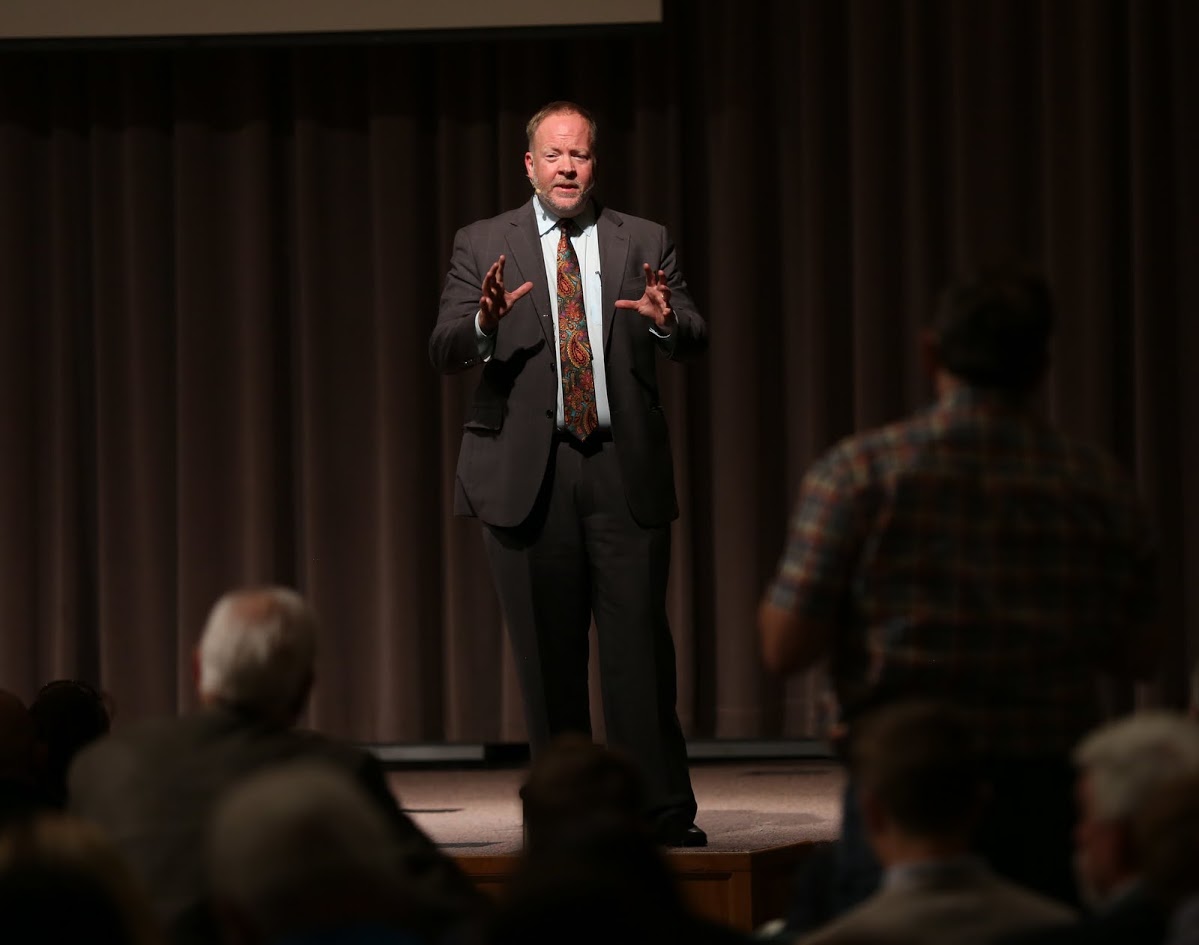
Dr. Bruce Gordon responds to a question at the end of his lecture about "What Happened to the Bible in the Reformation?" on October 19, 2017. Photo by Kristi Woody
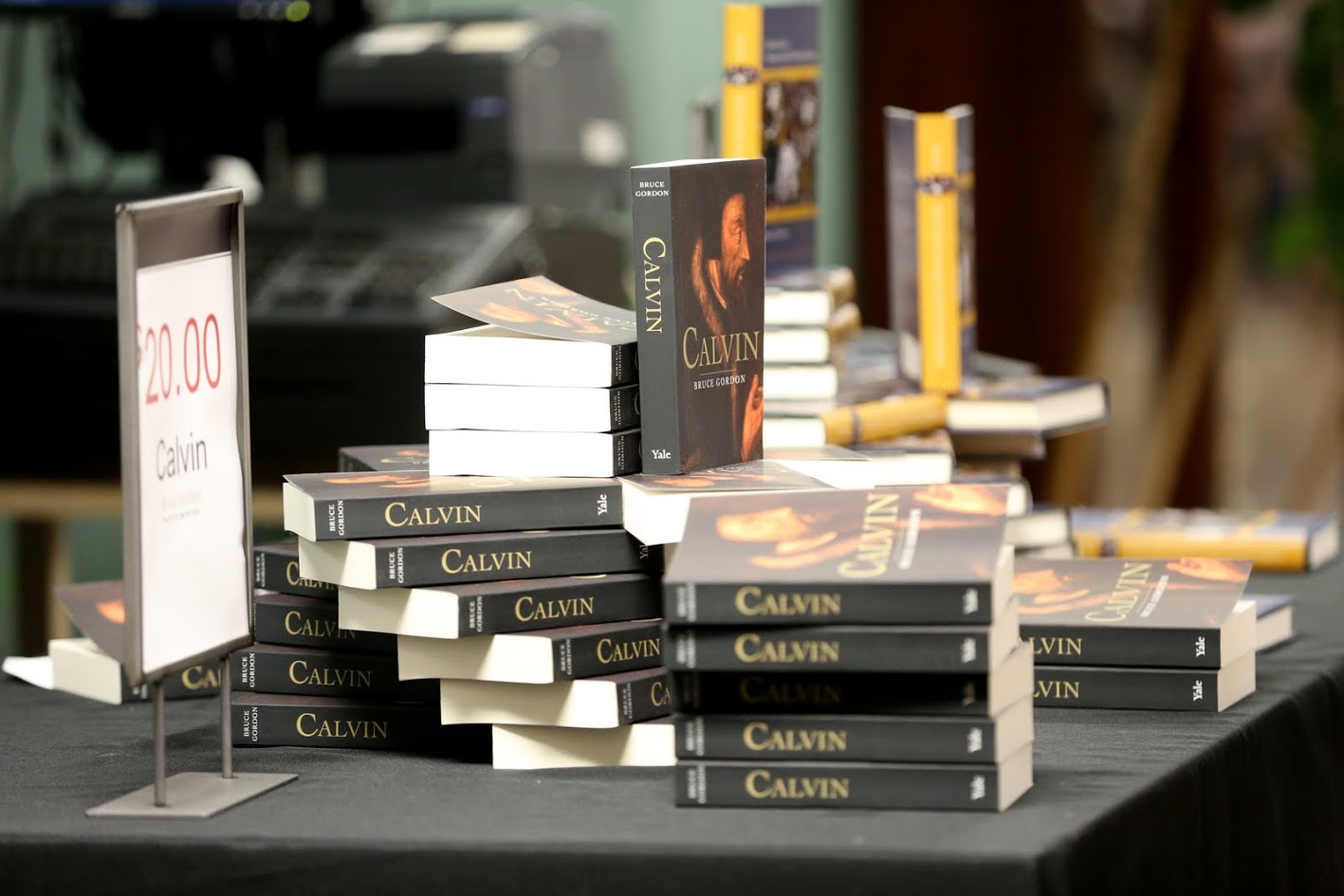
Copies of Dr. Bruce Gordon's books are on display during a book signing in Union's chapel foyer following Gordon's lecture about "What Happened to the Bible in the Reformation?" on October 19, 2017. Photo by Kristi Woody
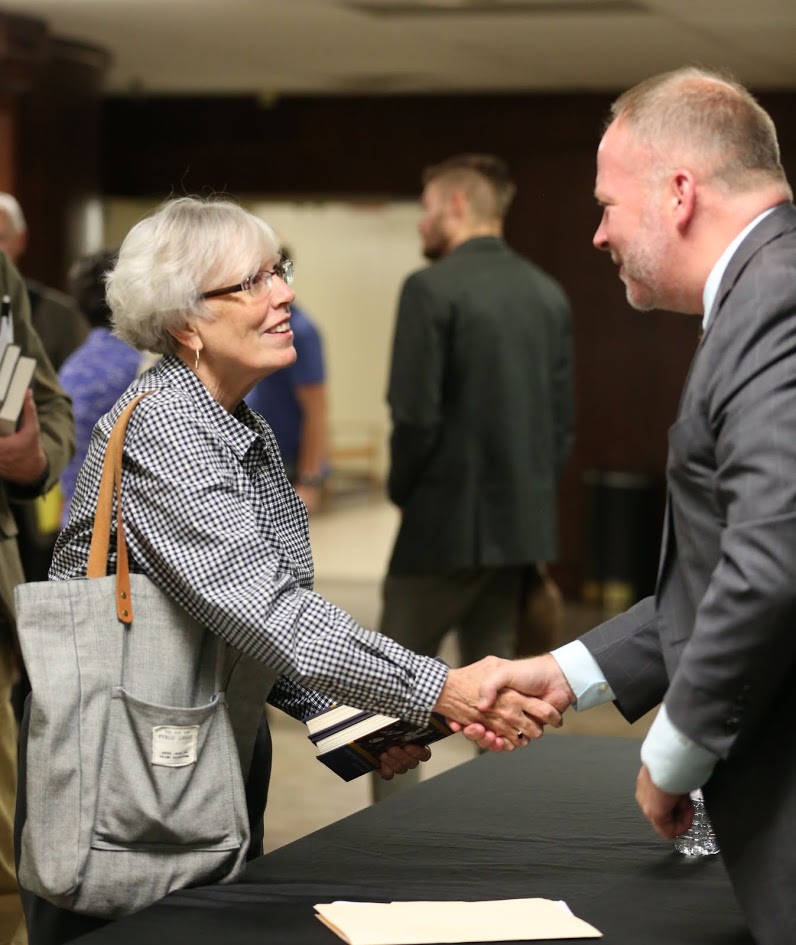
Nancy Thomas greets Dr. Bruce Gordon during a book signing following Gordon's lecture about "What Happened to the Bible in the Reformation?" on October 19, 2017. Photo by Kristi Woody
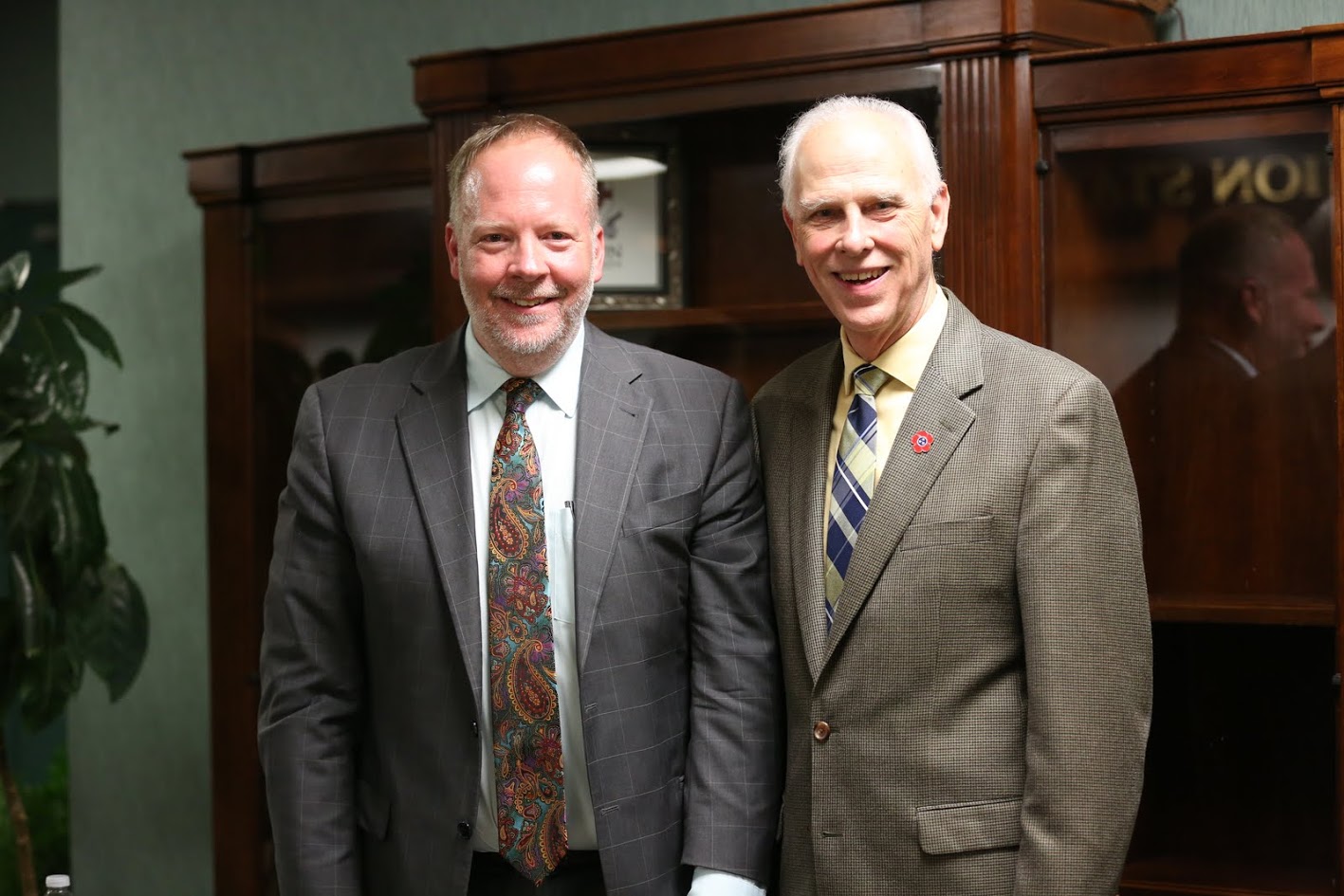
Dr. Bruce Gordon (left) of Yale Divinity School stands with Dr. Stephen Carls following Gordon's lecture on "What Happened to the Bible in the Reformation?" on October 19, 2017, as the Carls-Schwerdfeger History Lecturer. Photo by Kristi Woody
